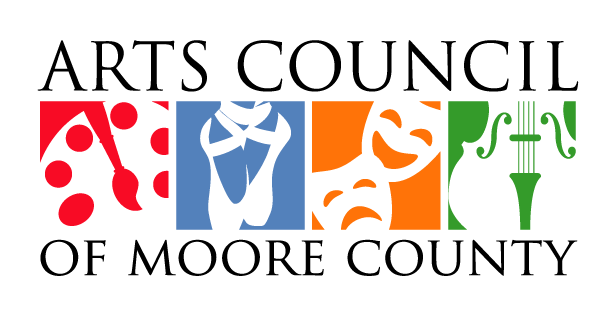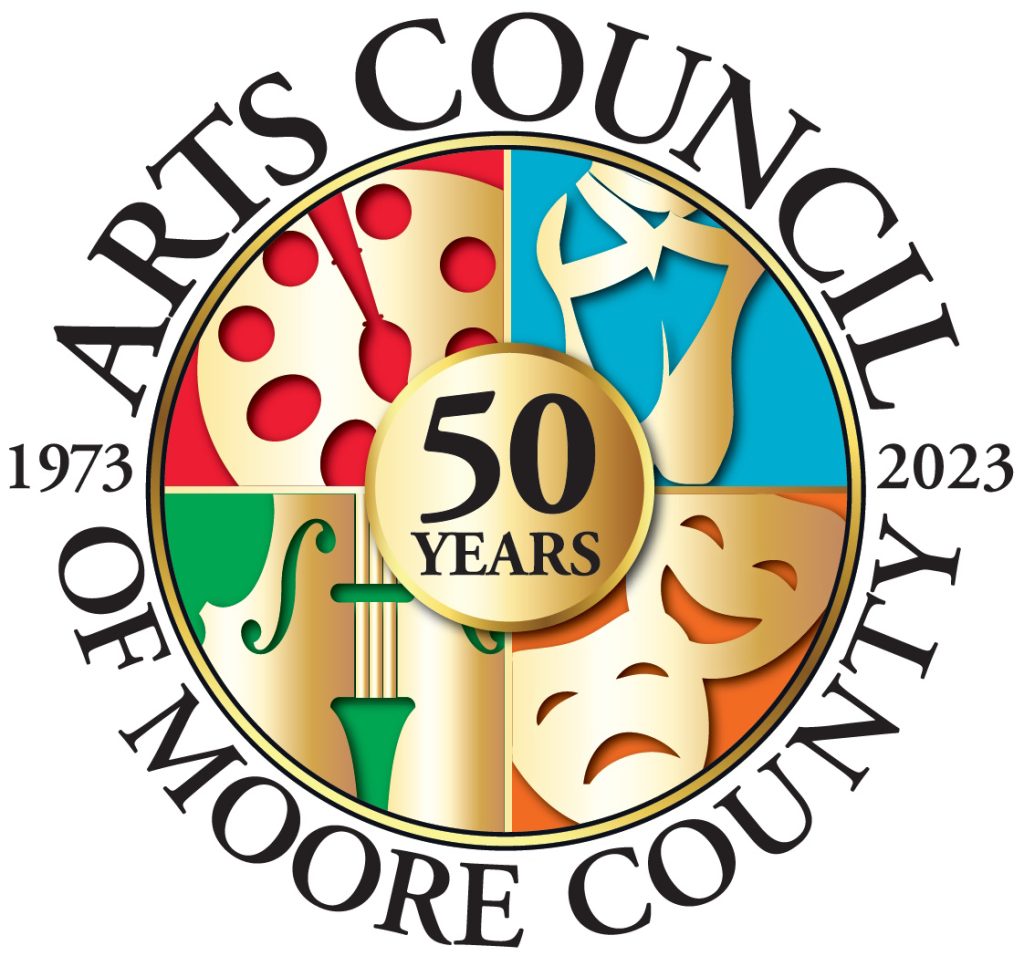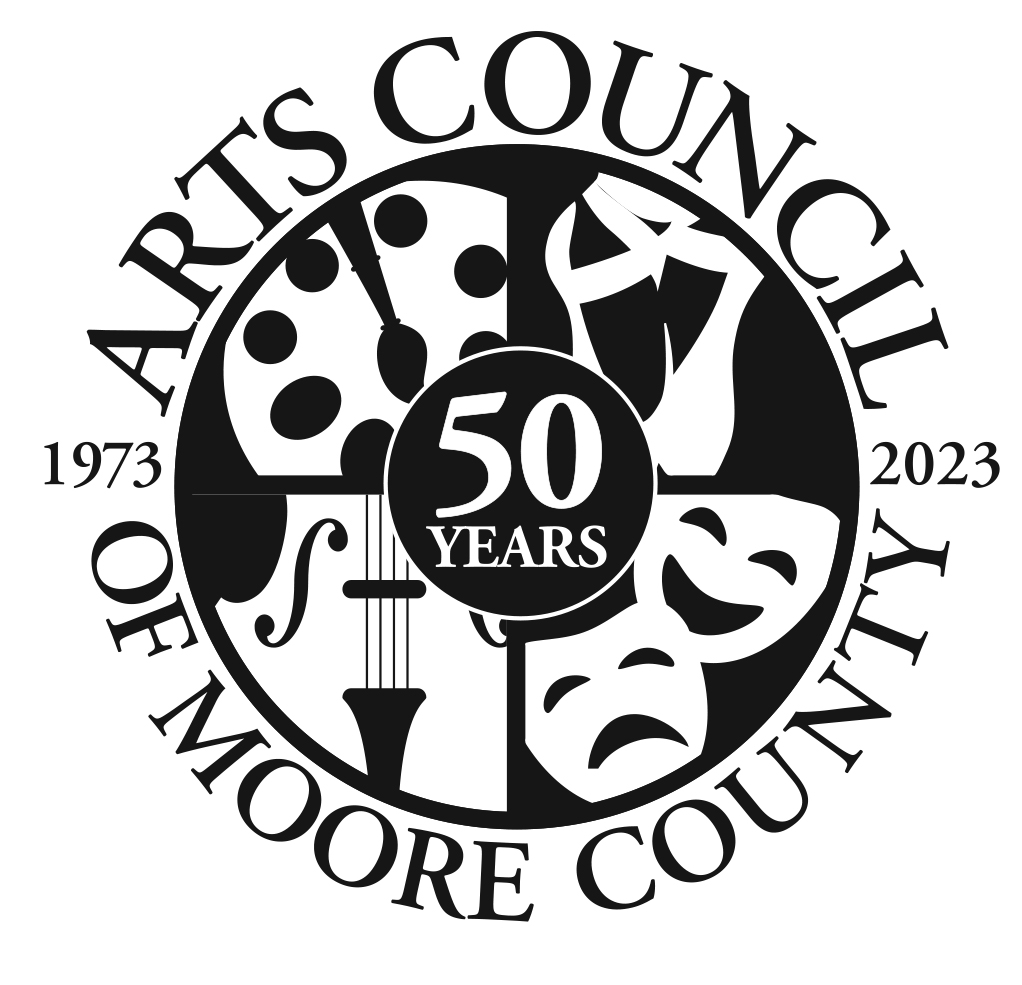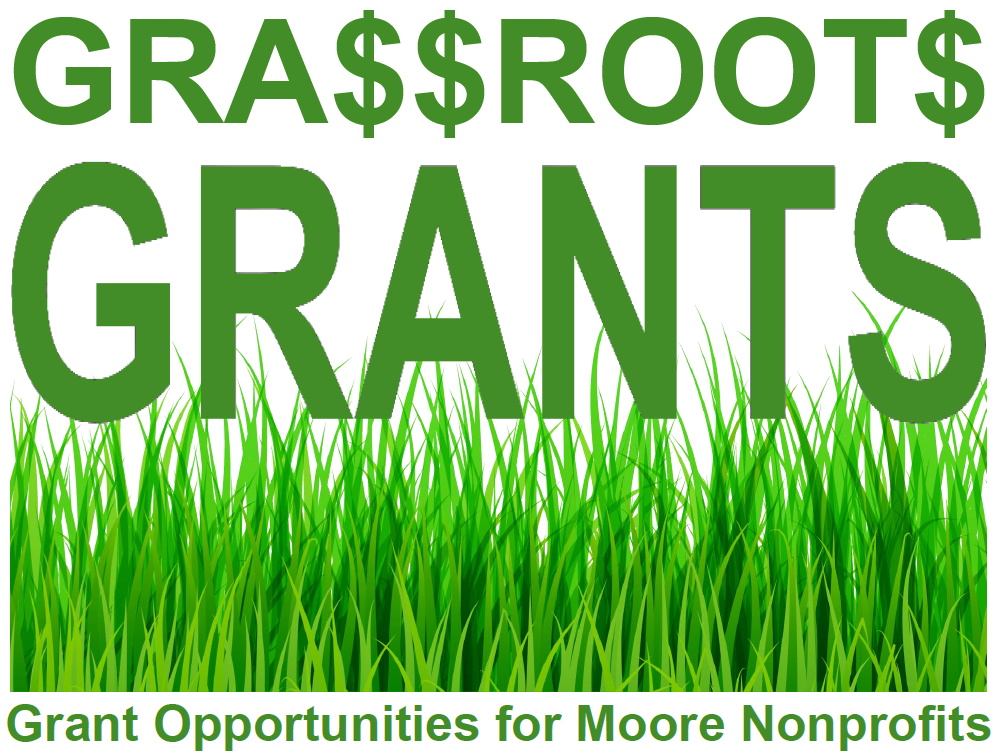 Is your organization or school planning an arts project in Moore County? Do you need funds to help get an arts project off the ground or just need operating funds? The Arts Council of Moore County may be able to help!
Is your organization or school planning an arts project in Moore County? Do you need funds to help get an arts project off the ground or just need operating funds? The Arts Council of Moore County may be able to help!
In 1977, the North Carolina Arts Council (NCAC) created the Grassroots Arts Program to provide North Carolina citizens access to quality arts experiences. The program distributes funds for the arts in all 100 NC counties through partnerships with local arts councils. The Arts Council of Moore County (ACMC) serves as the NCAC’s Designated County Partner in awarding Grassroots subgrants to local organizations for arts programs throughout Moore County.
Grant Deadline: 5:00 PM on August 23, 2024
Applications are available below
See below how your organization can get on this list…
WHO IS ELIGIBLE TO APPLY?
- All organizations must have been in operation for at least one year.
- Applicants must be a nonprofit organization with a 501(c)3 Federal tax-exempt status. (School projects are covered through Moore County School’s nonprofit status.) An organization without tax-exempt status may receive indirect funding for its arts project by having another nonprofit organization serve as its fiscal agent. It is the applicant’s responsibility to see that a copy of its (or its Fiscal Agent’s) IRS tax-exempt status is on file with ACMC.
- All organizations must operate and carry out project within Moore County.
- Only one Grassroots subgrant application is allowed per organization.
- Organizations that receive direct support from the NC Arts Council are not eligible for Grassroots funds.
- Individual artists are not eligible to apply for Grassroots Arts funds, but may apply for an Artists Support Grant.
- Applications and support materials must be complete and received by the grant deadline.
WHAT PROJECTS ARE FUNDABLE?
Grassroots Grants may be used for expenditures to conduct quality arts programs or operate an arts organization. Examples of arts programs that are commonly funded with Grassroots funds include:
- Performances
- Festivals
- Art Exhibitions
- After-school arts programs
- Arts camps
- Artist Residencies
- Artist fees for classes, workshops, masterclasses, clinics
- Marketing expenses
- Royalties, props, sets, and costumes for theatre performances
- Equipment rental
GUIDELINES FOR GRASSROOTS GRANTS
Please note the following guidelines for all Grassroots funds:
- Grassroots funds may not be awarded to individuals.
- Subgrants may not be awarded for for prizes, competitions, tuition, or financial rewards.
- Grassroots funds may not be used for activities associated with a school’s internal arts programs such as in-school student performances, purchase of art supplies, school trips, student competitions (in-school or off campus), or student publications.
- Grassroots funds may not be used to purchase art supplies or equipment.
- Municipalities (city/county governments) may receive grants for arts programs which use qualified artists to conduct programs that involve the greater community. Grants may not support internal programs, administration, or operating expenses.
- Colleges, universities, and libraries may receive grants for arts programs that are community-based or generate regional arts involvement. Grants may not support their internal programs, administration, or operation expenses (library books, band boosters, equipment purchases, etc.).
- Religious organizations or churches may not receive Grassroots funds unless the program is presented outside regular church services, engages the larger community, and does not contain religious content.
- Tribal organizations that receive Grassroots funds must represent state or federally recognized tribes. A list of approved tribes can be found at www.ncadmin.nc.gov/divisions/american-indian-affairs/nc-tribes.
- Grassroots funds may not be used for the following:
- Acrobatics
- Aerobic dance
- Art, music, and dance therapists (However, qualified artists conducting an arts program in a health care setting may be supported.)
- Artifacts
- Beauty or scholarship pageants
- Capital expenditures (Capital expenditures include expenses for purchase of buildings or real estate, renovations or improvements involving structural changes, payments for roads, driveways, or parking lots, or permanent and generally immobile equipment such as grid systems or central air conditioning.)
- Clowning
- Comedy
- Contingency funds
- Cosmetology
- Deficit reduction
- Essay contests
- Fashion shows
- Food or beverages for hospitality or entertainment functions
- Fundraising events
- Interest on loans, fines, or litigation costs
- Juggling
- Lobbying expenses
- Magic shows
- Martial arts
- Mineralogy/gemology
- Modeling
- Nature presentations
- Oral history and history projects (However, folklife documentation of traditional arts including the creation of interviews, photography, videography, and other documentary media is eligible for support.)
- Prizes, scholarships, or financial awards
- Purchase artwork
- Quiz bowls
- School band or choral activities or equipment
- Science programs
- Travel presentations
- Tuition for academic study
WHAT IS THE GRANT AMOUNT?
There is no set grant amount, but past grants have ranged from $500 to $2,500. For exceptional projects, more may be awarded. Organizations requesting larger amounts that fail to show good planning, sound financing, and innovation may actually be less competitive because the request overreaches the capacity to perform.
MATCHING REQUIREMENT
Subgrantees are required to match their grant funds dollar for dollar. The funds must come from other public or private sources. Other NCAC funds cannot be used as a match.
ACMC & NCAC SUPPORT RECOGNITION
Organizations awarded Grassroots funding from ACMC are required to recognize the Arts Council of Moore County’s and the NC Art Council’s investment in your program. Please adhere to the following requirements about logo and credit line use. Failure to provide proper credit may jeopardize future funding for your organization or program.
LOGO USE
ACMC and NCAC logos must be prominently displayed on-site and in all publicity and printed materials.
To Download the Arts Council of Moore County logo, click on the logo you desire below:
Download the North Carolina Arts Council logo HERE.
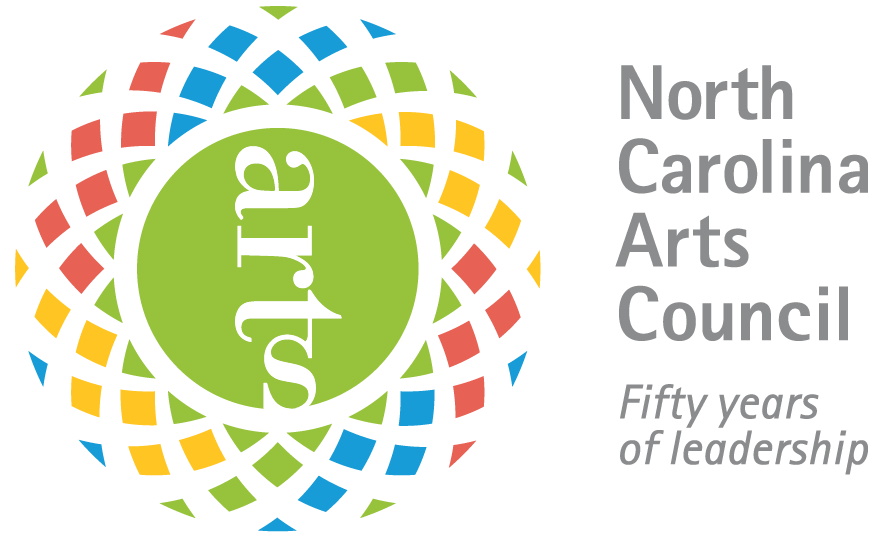
CREDIT LINE
Printed material and publicity regarding NCAC grants, funded activities, and/or partnerships must contain the following language with the appropriate logos (above):
This project is supported by the Arts Council of Moore County and the North Carolina Arts Council, a division of the Department of Natural & Cultural Resources.
Here is an example for including the logos & credit line on your materials:

HOW ARE APPLICATIONS EVALUATED?
All subgrant applications are reviewed by a panel of volunteer community members. The panel evaluates each application based on the subgrant guidelines and the following criteria:
- Artistic quality of proposed project or program
- Community impact of project or program
- Ability to plan and implement project
- Stability and fiscal responsibility of the organization
Panelists discuss and score the grant using an established rating system. The subgrant panel’s funding decisions are then presented as recommendations to the ACMC Board of Trustees. The board votes and gives final approval on the subgrant panel’s recommendations.
PRIORITIES OF FUNDING THIS YEAR:
The first priority of the Grassroots Arts Program is to provide operating or program support to qualified arts organizations including theaters, symphonies, galleries, art guilds, choral societies, dance companies, folk arts societies, writers groups, and arts festivals, among others. Grassroots funds are not awarded to arts organizations that receive funding directly through the NCAC’s General Support Program.
The second priority of the Grassroots Arts Program is to support arts learning and arts in education programs conducted by qualified artists. These can be artist residencies in schools, after-school programs, summer camps, or adult arts learning classes.
The third priority of the Grassroots Arts Program is to support community organizations that provide quality art experiences for the greater community. These programs must be conducted by qualified artists.
WHEN MUST MY PROJECT OCCUR?
ACMC holds one grant period each year–July 31 to June 30. All grant funds must be spent during this granting period. Any unused funds must be returned to ACMC.
WHEN IS THE GRANT DEADLINE?
2023-24 GRANT DEADLINE: 5:00 p.m. on August 18, 2023.
NOTE: This is not a postmark deadline; Your application and all attachments must be in the Arts Council’s office by the deadline in order to be considered for funding.
WHEN WILL I RECEIVE MY GRANT FUNDS?
All grant payments are contingent upon availability of funds from the State of North Carolina, and will only be paid after the Arts Council receives its Grassroots allotment from NCAC, which is usually by the end of October.
HOW DO I APPLY?
2023-24 SUBGRANT APPLICATION & OTHER FORMS
For your convenience, we have provided links to download the Grassroots Grant application and other forms you will need to complete and submit by the deadline. [If you have any trouble with the links/forms, please contact the Arts Council at 910-692-2787 or mickey[at]mooreart.org.]
For ALL Applicants:
2024-25 Grassroots Subgrant Application for all applicants: CLICK HERE TO DOWNLOAD [NOTE: This is a fillable PDF. Please do NOT reformat the application form.]
For “Non-government” Applicants Only:
No Overdue Tax Due Form – Please format on your organization’s letterhead.
Model Conflict of Interest Policy – Please format on your organization’s letterhead.
Please complete the form(s) and submit to ACMC according to the directions below.
HOW TO SUBMIT AN APPLICATION
Applicants may only submit one (1) application per year. Once your application is complete, please make five (5) copies of the full application and all attachments and mail to Arts Council of Moore County, Attn: Grassroots Committee, P.O. Box 405, Southern Pines, NC 28388 or hand-deliver to the Arts Council Galleries at Campbell House, 482 E. Connecticut Ave., Southern Pines, NC.
FISCAL SPONSOR
A nonprofit organization with tax-exempt status may act as a fiscal sponsor for an applicant organization that has applied for, but not yet received its tax-exempt status. In cases where a grantee is using a fiscal sponsor, both the fiscal sponsor and the grantee organization are fiscally and legally responsible for all grant requirements, and both must be in good standing with the state of North Carolina. A copy of the letter from the IRS stating that the application for tax-exempt status has been received or a copy of the application submitted to the IRS is required with the application support materials. The fiscal sponsor is responsible for the expenditure of all project funds and is liable for the repayment of any grant funds not spent or spent incorrectly. The fiscal sponsor may charge the grantee for its services. More information on the requirements of fiscal sponsors can be found under Grantee Requirements. Any exceptions to the policy will be noted in the respective grant guidelines.
LEGISLATIVE LETTERS
Grant recipients are asked to write their state representatives to thank them for providing Grassroots funds for their arts project. The letters should provide information about how Grassroots funds were used to support your program or project, and the community impact of the event. A copy of all letters to legislators must be included in the subgrantee’s final report.
REPORTING REQUIREMENTS
SUBGRANT REPORT FORM
Each subgrantee is required to submit a final report providing a short description of the funded project, participation statistics and demographics, and sample marketing and program materials showing the NCAC & ACMC credit line and logos. For your convenience, the link to download the report form is below and it must be submitted within 30 days after your project is complete or June 30, 2024, whichever occurs first.
2023-24 Subgrant REPORT Form for All Grant Recipients [NOTE: This form is a fillable PDF. Please do NOT reformat the report form.]
For questions and additional information, please contact Mickey Walker at 910-692-2787 or via Email.
